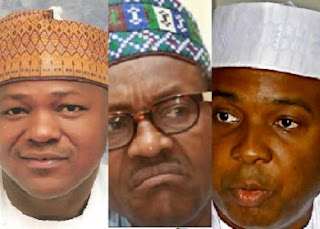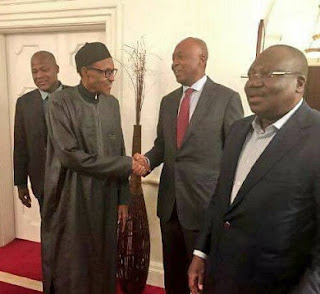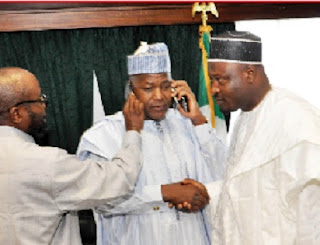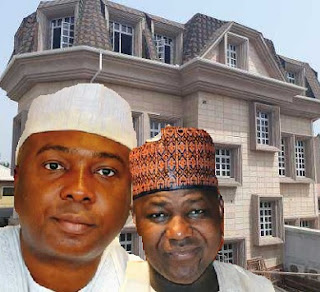The lawmakers in both lower and upper chambers of the national Assembly has reportedly moved against the duo of the leaders, the President of the Senate, Bukola Saraki and the Speaker of the House of the Representative, Yakubu Dogara over what they described as the secrecy of the budgetary allocation of the chambers,
News Punch learned reliably
According to
Premium Times, the secrecy with which the National Assembly has handled its budgets, and the lopsided manner it distributes funds for zonal intervention projects, are unsettling the lawmaking body and putting members on a collision path against the leadership,
Recalls the ousted Senate Leader, Ali Ndume, had on January 10, challenged the Senate President, Bukola Saraki, to make the budget open, disclosing that he and his colleagues, like most Nigerians, had no knowledge of details of the NASS budget.
Such calls have grown in the last week, and have become even more intense in the House of Representatives which for most of last year was at the centre of a devastating budget padding scandal triggered by former appropriation committee chairman, Abdulmumin Jibrin.
Mr. Jibrin accused his former ally and speaker of the House, Yakubu Dogara, of inserting fictitious projects worth billions of naira into the national budget, an allegation the speaker denied.
Presently, lawmaker-colleagues are agitating for the House budget to be made open, and for a more equitable allocation of funds for so-called intervention projects, several lawmakers told confided in
our source
Legislators, many of them principal officers, and administrative offices of the National Assembly, said the budgets of the Senate and the House were known only to the Senate President, the Speaker and the Clerk to the National Assembly.
“It’s so secret that neither the Senate Leader nor the House Leader knows what is in the (budget),” said one source.
Mr. Saraki, according to Premium Times has repeatedly failed to honour his pledges to make details of the N115 billion 2016 National Assembly budget public.
With N23.347 billion in 2003, the National Assembly’s budget now stands at about N115 billion yearly, representing over 492 per cent rise in 13 years.
Until 2016, the budget had often gone as high as N150 billion a year.
In 2010, when the budget hit a shocking record sum of N154.2 billion, David Mark, Mr. Saraki’s predecessor, decided to block Nigerians from knowing details of how the National Assembly’s jumbo allocations were spent. The policy especially concealed how much members earned in allowances.
In one masterstroke of legislative brinkmanship, the National Assembly under Mr. Mark, made itself member of an exclusive club of agencies whose are deducted en-bloc (first-line charge) via statutory transfers, without disclosures.
Apart from the money allocated for the National Assembly to fund its budget on first line charge, the body gets N100 billion for “zonal intervention projects”, commonly called “constituency projects”.
The Senate, with 109 members, takes 40 per cent of that amount, while 60 per cent goes to the 360-member House.
All the constituencies take share. But the sharing is so skewed that while a principal officer’s constituency gets projects that are worth over a billion naira, an ordinary member’s constituency may get a single project valued at N50 million.
“My constituency gets N38 million (for zonal project) in 2016,” said Aliyu Madaki, Kano lawmaker, who is amongst the members calling for reforms.
A previous investigation by PREMIUM TIMES showed that the constituency projects are at best a clever way of deceiving Nigerians, and at worst an outright theft of public funds.
While benefitting lawmakers are not paid directly, they and MDAs in which zonal projects for their constituencies are domiciled, are involved in an organized network whereby the legislators nominate through “letter of introduction” contractors who get contract awards from the MDAs.
In most cases, the contractors are predictably, fronts for members.
They pay “returns” to the lawmakers, and would therefore be at liberty to deliver a shabbily executed project.
The spokesperson for Mr. Saraki, Yusuph Olaniyonu, denied Senators were agitating for reforms of how zonal intervention fund is shared.
“There is nothing like that,” he said.
The spokesperson for the House, Abdularzaq Namdas, did not deny the agitation for reform but explained the rationale for the current sharing formula.
“The issue of zonal intervention projects has been like that for long,” said Mr. Namdas. “The money is shared among the zones; that’s why it is called zonal intervention. So, if you are from a large state with many constituencies, you are likely to get low allocation.”
The spokesperson meant that a lawmaker from Kano or Lagos for instance was going to get allocation far less than what will be due to one from Bayelsa State.
But a Senator, seeking anonymity, disagreed.
“That’s the explanation but it is just about convenience. Why? A principal officer irrespective of his state or zone get huge allocation for his constituency. I mean if that explanation is valid and consistent Gbajabiamila who is from Lagos, with many constituencies should get something like N50 million, but he got about a billion naira,” the Senator argued.
Similarly, even lawmakers in Mr. Dogara’s camp are not buying Mr. Namdas argument.
“Is it wrong,” asked Adekola Adekoya, Ogun State, rhetorically, when his comment on the agitation for reform was sought.
“It is not bad. We want equitable distribution. I have studied the Speaker closely. I am persuaded that the leadership of the National Assembly, especially the Speaker, is looking at the agitations.”
Compelled by the agitations, the Speaker, last week, set up a six-man committee to review the sharing of the zonal intervention funds, the votes and proceedings for Wednesday showed.
A lawmaker said the committee was set up by the Speaker to defeat the call for an executive session to discuss the agitations.
“No to zonal representation,” said Mohammed Soba, Niger State, stressing that all members should discuss the agitation.
Whichever way, Mr. Soba expressed expectation that outcome should be known “very soon”.
“That (outcome of the agitation) should be before the end of the budget process.”
Budget Disclosure
The leadership of the House asked members to disregard allegations made by Mr. Jibrin, a source said.
“But members believe they don’t have what to use to defend themselves before their constituents against Jibrin’s allegations because they don’t know details of their own budget,” said the source, providing basis for the call for disclosure to members.
Yet, it appears the lawmakers are not “very” concerned about the disclosure as much as the agitation for zonal intervention reform.
Several lawmakers told PREMIUM TIMES that the National Assembly leadership, particularly the Senate President and the Speaker of the House of Representatives, use the budget to control lawmakers, tactically determining who gets what and when.
“Because most of us benefit from these allowances, it is really difficult to speak publicly against the leadership,” a member of the House of Representatives said.
Mr. Adekoya said he didn’t “totally” agree the budget was not known to the lawmakers.
He suggested there is possibility for the lawmakers to understand what the details of the budget are, using what they earn and use.
“If I am given N2, 000, I should be able to multiply that by 365 days. I know I use AC in my office. We have staff. There are directors and staff who are civil servants,” he said.
But the Reps’ spokesperson, Mr. Namdas, did not gloss over the secrecy around the budget. He said the leadership of the House had promised to disclose the details of the budget “not only to members but also to the public.”
A source close to Mr. Saraki said it was not as if the Senate President was not ready to disclose the NASS budget.
“But a lot of the lawmakers are not well disposed to it because they feel it will expose them to the public,” the source said.
Some insiders said many lawmakers do not care about knowing what is in their own budget, and are prepared to also stop the public from knowing, so long as their earnings keep coming.




















